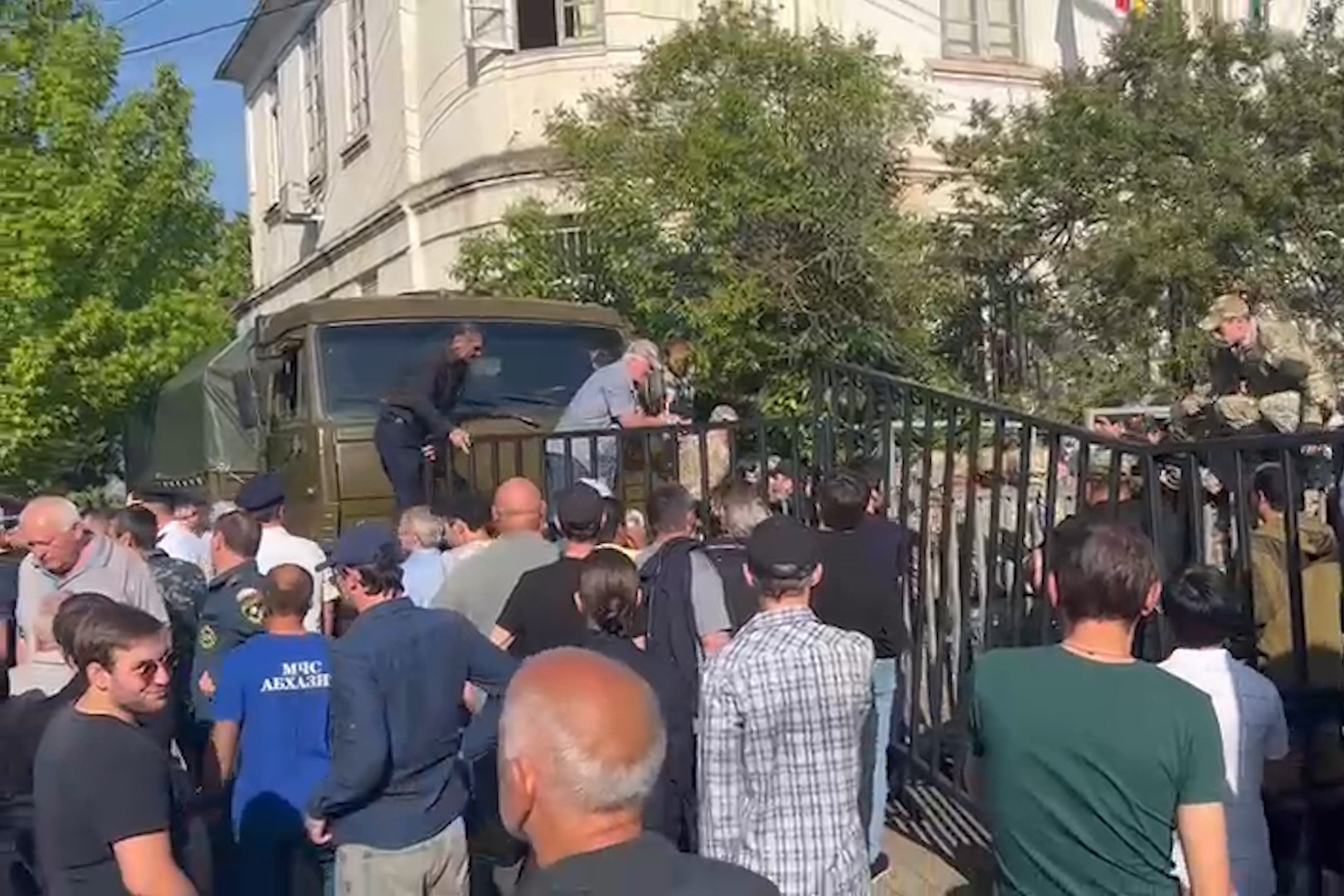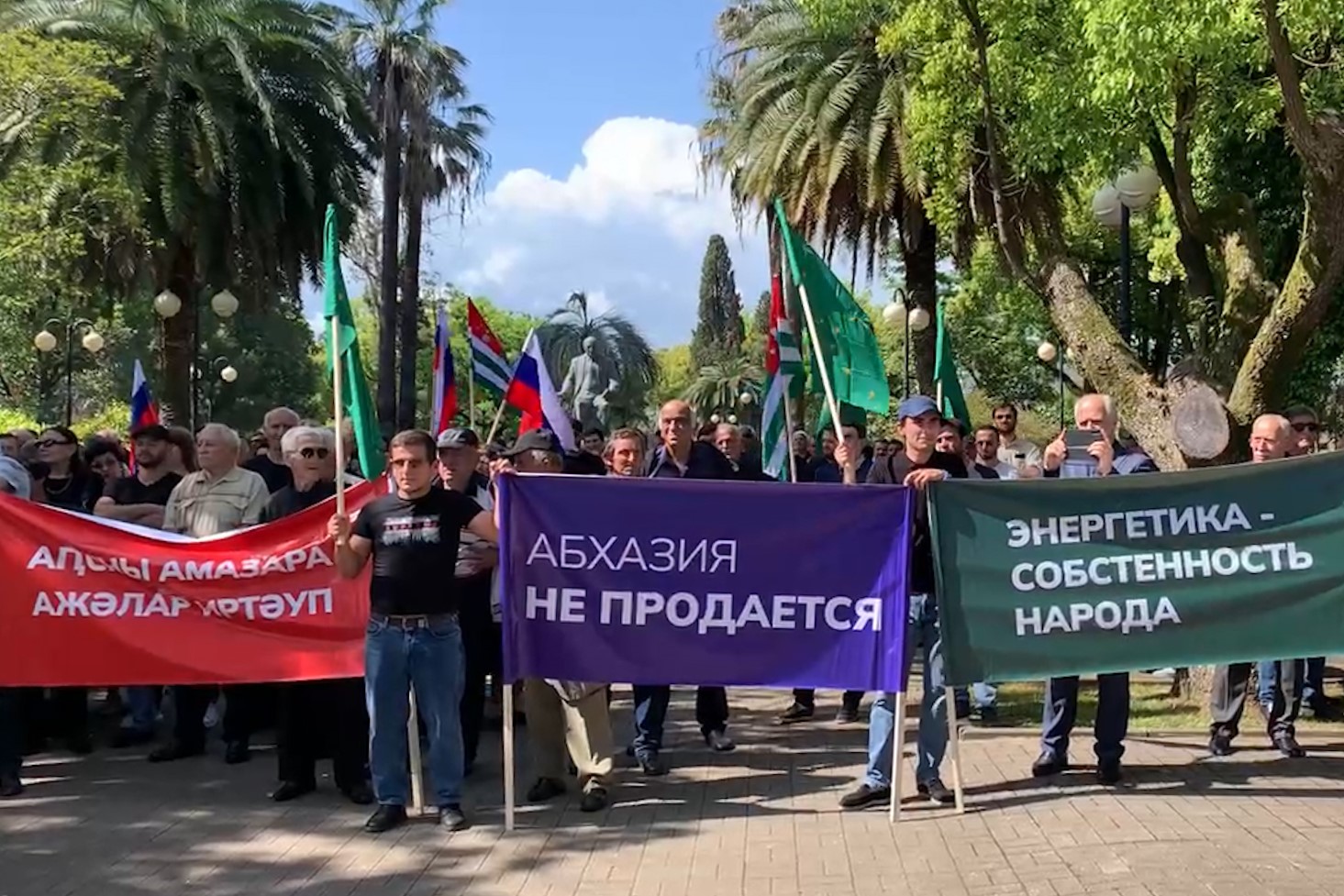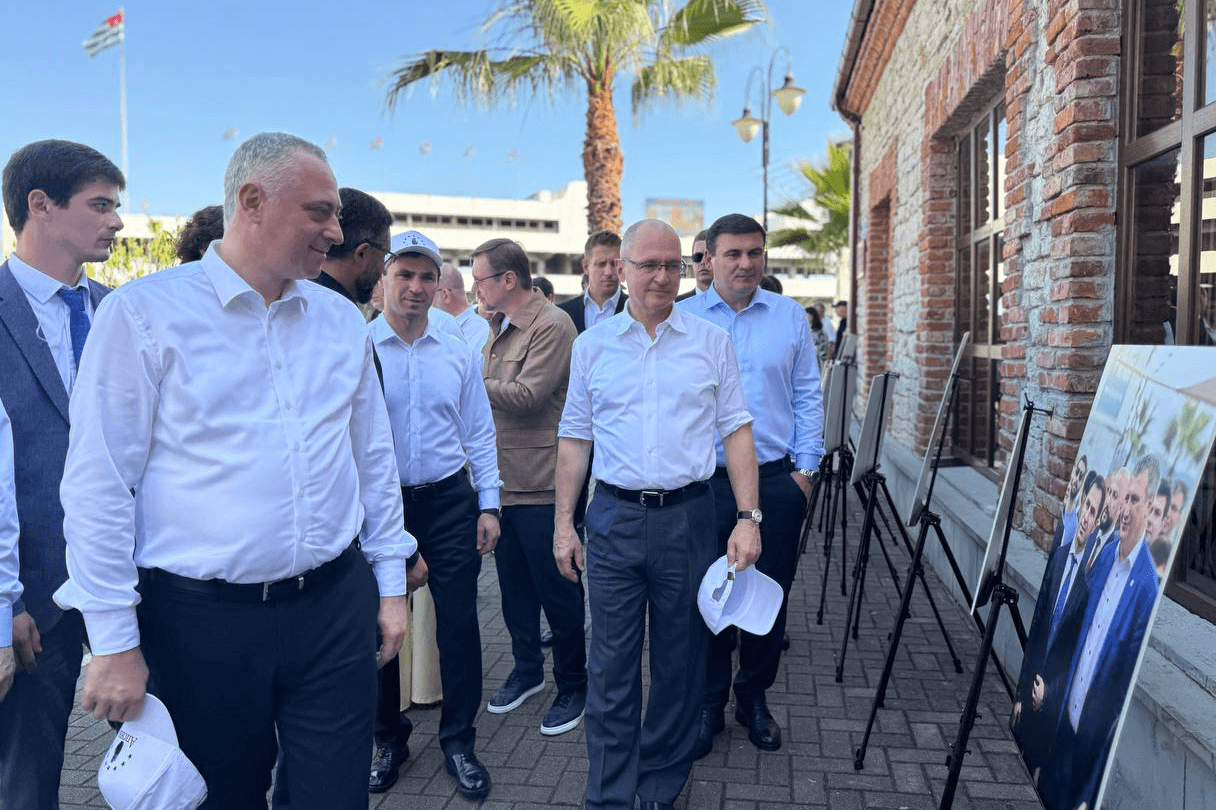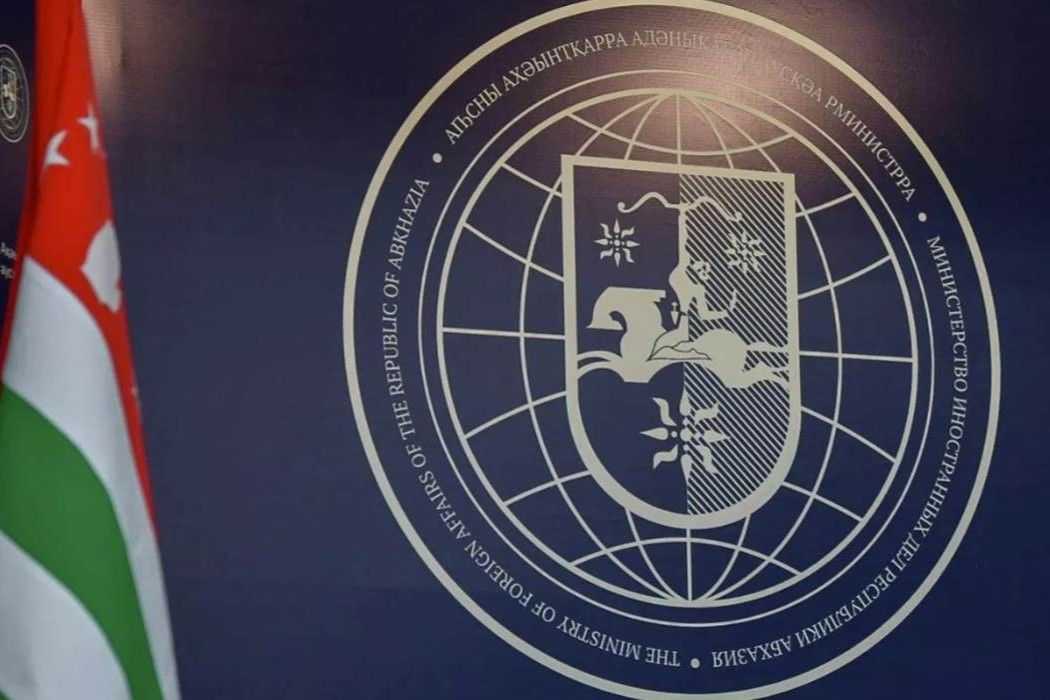
Abkhazia’s opposition held a protest and met with President Aslan Bzhaniya on 30 May. Despite all their demands being refused and unprecedented security measures put in place by the authorities, no significant conflicts took place.
A few hundred opposition protesters gathered outside the Presidential Administration building in Sukhumi (Sukhum) at around 14:00 on 30 May, after over a month’s preparation for the event.
At 17:00, a group of opposition representatives presented President Aslan Bzhaniya with the demands of the opposition, which included the government’s resignation, and the withdrawal of a controversial law on apartments and the Pitsunda state dacha deal with Russia.
Those representatives included veterans Vianor Ashba and Temur Gulia, and Said Butba, chair of the Veterans and Youth of Abkhazia public organisation.
Bzhaniya refused all the presented demands, but claimed that his government had set up a ‘council on reforms’ to discuss issues and cooperate with opposition organisations.
‘We intend to continue working on reforms. If you take part in this, I will be very grateful to you,’ said Bzhaniya.
Following the meeting, Adgur Ardzinba, leader of the nationalist opposition Abkhaz People’s Movement and one of the main organisers of the protest, suggested that the protesters regroup on another day, as they had received permission to protest only until 19:00.
However, a group led by veteran Vianor Ashba moved towards parliament, demanding concrete results, and were detained by the security forces. The head of Abkhazia’s State Security Service promised that all detainees would be released by midnight, which, the following day, opposition representatives confirmed had taken place.
Barricades and snipers
The run-up to the protest was marked by significant reinforcement of government security. In the days prior, security services arrested a number of individuals alleged to be criminals, with Ashba claiming at the protest that a number of fighters from the Pyatnashka international paramilitary brigade had also been detained in Gudauta.
The night before the protest, a barricade of government vehicles was set up around Abkhazia’s central government complex, and metal fences put up along the complex’s perimeter, welded together and braided with barbed wire. On the morning of 30 May, the strength of these barricades was assessed by the head of Abkhazia’s Security Service, Dmity Dbar. A bridge connecting the embankment to the grounds of the Presidential Administration building was also removed overnight.
Protesters, however, found ways in regardless, climbing under and over the bumper of a military truck parked near the metal fence.

Once the protest began, those attending also shared photographs showing people in camouflage on the roof of the Presidential Administration building, with speculation that those photographed were snipers. Messages sent in protesters’ group chats additionally claimed that Robert Kiut, the head of Abkhazia’s State Security Service, ‘gave the go-ahead’ to shoot at protesters’ feet.
This information could not be verified, and the protest remained sufficiently peaceful that force was not used against those demonstrating at any point.
This was in line with the protest organisers’ intentions, but a strong contrast to the last major opposition protest to take place in Sukhumi.
Adgur Ardzinba, leader of the nationalist opposition Abkhaz People’s Movement and one of the main organisers of the protest, repeatedly stated that the protesters would act ‘within the legal framework’, and that he had received official permission to hold the rally at the Sukhumi City Administration building.
The participants of both the anti-government and pro-government rallies were given water provided by the government, and hot lunches were given to protesters on both sides from a field kitchen on the lawn of the Presidential Administration, with participants clearing up their litter at the end of the protest.
While the level of security provisions on the government’s side was unprecedented, many were also surprised by the opposition’s calm acceptance of the government’s refusal to make concessions. At the last major opposition protest in December 2021, violence followed Bzhaniya’s refusal to address the protesters, but on this occasion, Ardzinba emphasised that the protest would end at the time approved by the authorities.
Internal divisions
The protest’s main tenets were printed on large banners: ‘We are against… the law on apartments, the settlement of Abkhazia, the distribution of Abkhazian land, the raising of energy tariffs’.

However, amongst those speaking, positions were less unified.
While the majority of those in attendance called for a change of government, Vianor Ashba, a veteran and prominent opposition figure, demanded that President Aslan Bzhaniya resign.
Leading opposition figures Natalie Smyr, a former member of parliament and current chair of the expert group Aamta, and Amiran Kakalia, who held bureaucratic posts in the former government, did not repeat this demand, limiting themselves to more broadly criticising the government, whom they accused of selling Abkhazia and its resources.
Internal disagreement amongst the opposition had prompted distrust amongst some of those attending the protest.
‘Let them first decide how they will improve the life of the people, and then get into power’, said one of the attendees.
But most of those who gathered on the Makhadzhirov embankment towards the evening of 30 May supported the broad ideas of the opposition, and were united in their objection to the current government.
‘I am not for Adgur [Ardzinba], or Vianor [Ashba], or Vasya from the next building, I am for Abkhazia to prosper’, said one of the protesters. ‘But if we give all the best lands to the oligarchs, they will prosper, and not with us here. Therefore, I am against the policy of the current government’.
A similar number of protesters gathered for a counter-protest supporting the government behind the metal fence on the side of the Presidential Administration building, albeit with their numbers bolstered by representatives of law enforcement agencies, the Ministry of Emergency Situations, and other government officials.
‘We have elected a president, which means we trust him’, said one pro-government protester. ‘I do not see anything anti-people in his actions. Everything he does, he does to make our life better. His term ends in 2 years, then we will choose another one, if this one does not suit.’’
After the representatives returned from their meeting with the president, the opposition announced that they would continue their protest on another day, with the aim of changing the government. The date of the next protest has not yet been announced.
For ease of reading, we choose not to use qualifiers such as ‘de facto’, ‘unrecognised’, or ‘partially recognised’ when discussing institutions or political positions within Abkhazia, Nagorno-Karabakh, and South Ossetia. This does not imply a position on their status.







